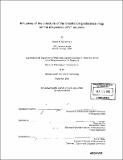Influence of the structure of the orientation preference map on the responses of V1 neurons
Author(s)
Schummers, James M. (James Matthew), 1973-
DownloadFull printable version (4.616Mb)
Other Contributors
Massachusetts Institute of Technology. Dept. of Brain and Cognitive Sciences.
Advisor
Mriganka Sur.
Terms of use
Metadata
Show full item recordAbstract
The large majority of inputs to primary visual cortex (V1) neurons arise from the dense local projections of neighboring neurons. Although several proposals have been made, it is not known what role these connections play in shaping the response properties of V1 neurons. It was reasoned that the influence of local inputs on orientation tuning should be different at different locations in the orientation map, because the available data suggest that the orientation composition of the local connections varies with location in the map. In particular, near pinwheel centers, neurons of varying orientation preferences are likely to be connected, whereas far from pinwheel centers, the local connections are likely to only connect similarly tuned neurons. To approach this issue, the responses of neurons at pinwheel centers, and in orientation domains have been compared. The subthreshold responses are found to have much broader orientation tuning near pinwheel centers, reflecting the broader orientation specificity of local connectivity. However, the broad subthreshold inputs are filtered out by the spike threshold and strong inhibition, such that spike tuning is similar at all locations in the orientation map. Spike tuning in pinwheel neurons is found to be sharp during the entire timecourse of the response, suggesting that the mechanism that sharpens the broad inputs is rapid and stable. The broad connectivity near pinwheel centers also leads to correlated firing between pairs of neurons with widely different orientation preferences. Thus, the local inputs to a V1 neuron depend on its location in the orientation map, but the inputs are filtered to produce sharp orientation tuning, regardless of the selectivity of the inputs.
Description
Thesis (Ph. D.)--Massachusetts Institute of Technology, Dept. of Brain and Cognitive Sciences, 2003. Includes bibliographical references.
Date issued
2003Department
Massachusetts Institute of Technology. Department of Brain and Cognitive SciencesPublisher
Massachusetts Institute of Technology
Keywords
Brain and Cognitive Sciences.